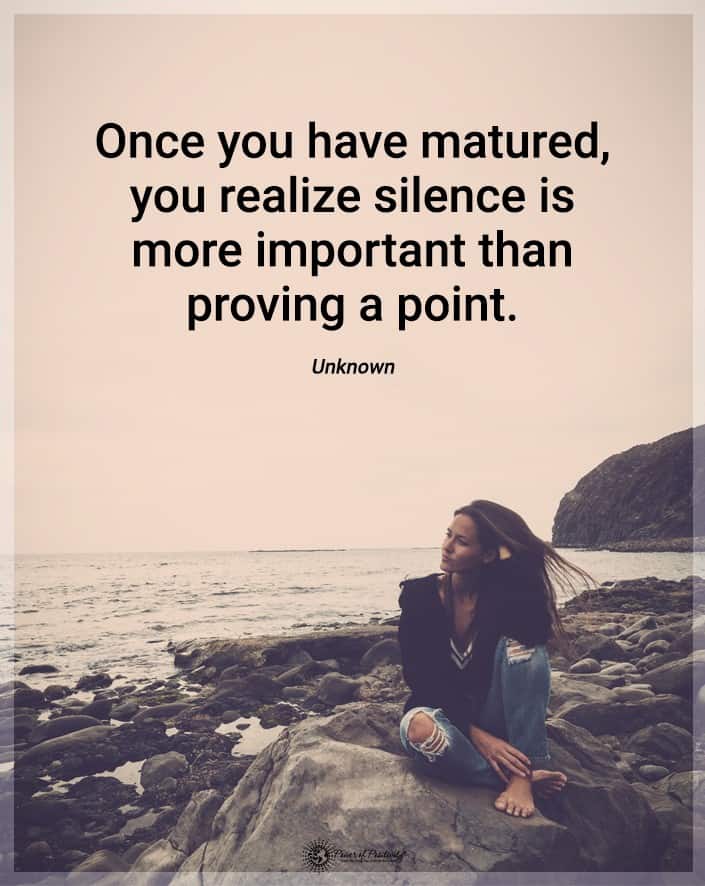Emotions can be overwhelming and frightening. You might turn to various methods to dampen the severity of what you feel. Commonly, you may decide to fight your emotions by pushing them away or denying them. Or they may feed their feelings instead of further stoking them out of proportion.
But neither of those tactics allows you to take the most necessary step: feeling your emotions. Here are three reasons you shouldn’t feed or fight your emotions and ways to handle them instead.
Why You Shouldn’t Feed Or Fight Your Emotions
Practice self-awareness to avoid doing these things. Here are three reasons why:
1. It’s An Avoidance Tactic When You Fight Your Emotions
Both feeding and fighting your emotions are forms of avoidance. And avoiding how you feel is never a good way to handle those emotions, especially for more complex or challenging situations! It’s easy to understand how fighting emotions end up being a means to avoid them. You push those feelings away, so you don’t have to deal with them. This can take many forms, including:
· Distraction
You might try to distract yourself from your emotions by throwing yourself into work, hobbies, or various forms of media. You can become highly absorbed in something and tire yourself out through it. In the process, you falsely believe that you are being productive and think this is an excellent way to cope.
· Mental Leaps
There’s no end to the mental jumps you may go through to fight your emotions by avoiding them. You might attempt to intellectualize or rationalize your feelings, thus depriving yourself of their actual nature. You might convince yourself that your feelings are not valid and push them aside. You could criticize yourself for having those emotions at all. These sorts of mental jumps remove you from reality and can damage your self-esteem.
· Imagining Escape
You might fight your emotions with avoidance by imagining an escape from them. This habit is different from visualizing success, which is inherently optimistic. Instead, it involves becoming wholly lost in fantastical ideas of a way to be free of these emotions. For example, you might envision winning the lottery and moving to a different country. Or you may mentally rehash arguments, again and again, imagining that you said something different.
But what about feeding emotions? How can actively encouraging your feelings somehow be avoiding them? The truth is a little surprising! Instead of experiencing the validity of emotion, you wind up further inflating it into something different. You disconnect from reality and create a different, more extreme version of events.
This almost makes your feelings feel more justified to you. Instead of accepting your emotions as they are, you stroke their fire to make them worse. To do feed your emotions with avoidance, you might:
· Transfer Accountability
To make yourself feel more justified, you may shift accountability onto others. You may imagine someone you have a conflict with to be a truly evil person. Or you might blame difficult life circumstances for what is happening to you, excusing your behavior based on your past experiences. You do anything to play the victim in this scenario.
· Criticize Yourself To An Extreme
You may think back on your life and pinpoint all the times you’ve felt similarly. You then inflate them, stating that they’re all your fault, even when they were outside of your control. This leads you to believe that you are entirely deserving of negativity. Your feelings then morph into something more complex.
· Unhealthily Express Your Emotions
You may throw things, storm around, or kick and scream to express how you feel. These actions only serve to make you angrier in the long run. They heighten your stress levels and distract you from reality.
Worse still, all forms of emotional avoidance are also types of suppression. They repress how you genuinely feel. Research shows that suppressing feelings makes them much worse and can manifest in many unhealthy and harmful ways!
2. It Gives You Huge Amounts Of Stress If You Fight Your Emotions
Fighting or feeding emotions both put a lot of mental and physical strain on the body. You experience a lot of stress when you perform these actions. Your hormones go into overdrive as you produce more and more stress hormones like cortisol and adrenaline.
This is because the act of denying feelings makes the body enter a minor sort of fight-or-flight mode. Your body then focuses on survival, unable to perform regular daily functions with ease. Its entire goal is to keep you safe – and, ironically, the only thing it’s doing is making things worse!
Allowing yourself to interact with and feel your emotions diminishes stress. Your brain and body learn to handle these experiences with a level head, building emotional strength in the process.
3. When You Fight Your Emotions, It Stops You From Moving On
Dwelling on bad things by fighting or feeding them prevents you from moving forward. But that’s part of what gets so addictive! When you fight your emotions, there’s some form of payoff that makes you feel good at the moment. You might feel validated, self-righteous, or protected by your denial. In the short-term, that can be useful as a coping mechanism – but then it comes back to bite you.
The only way to move on from strong negative emotions is by feeling them. You have to get close to the truth of those emotions and allow yourself to experience that realistically. This is because feeling your emotions lets you:
· Remember Roots and Meaning
When you fight your emotions, it’s easy to lose sight of what matters. You get so wrapped up in what you feel that you can’t see the forest for the trees. You act based on tiny clues of emotion and never get down to what’s causing them because you’re fighting them so hard! Without the ability to dig at roots, you can’t ever move on from feelings.
· Make Decisions
Knowing how to process, regulate, and feel emotions truly allows you to make rational decisions. You know what parts of you are driven by emotion and react to them accordingly instead of letting them subconsciously influence you. In the famous book “Descartes’ Error: Emotion, Reason, and the Human Brain,” we’re reminded of this. The expert author states that emotional context is central to wise decision-making!
· Learn and Grow Instead Of Trying to Fight Your Emotions
The ability to feel complex emotions allows you to learn from them and reflect on them. You have the opportunity to learn from each one, update your knowledge as you go, and realize your true capabilities. If you only fight your emotions, you’ll spend so much time avoiding them, and you can’t learn from what you avoid.
How To Feel Your Emotions
1. Observe and Acknowledge Them
To feel something, you have to acknowledge that it’s there. This is why you must mindfully observe and be open to the emotions and sensations you feel. Try performing these four steps:
· Step 1: Pause
When you feel a strong emotion beginning to bubble, take a deep breath and pause. Don’t react – just hit the brakes. If necessary, you can also remove yourself from the stressful environment for a few minutes.
· Step 2: Scan Your Body
Carefully observe your body from head to toe. With your mind, scan every single part of you in an organized manner. Observe what each body part is doing and how it is feeling. Where are your emotions physically manifesting?
· Step 3: Mindfully Note Everything
Acknowledge and state how each part of your body has reacted, whether out loud or in your head. It is crucial to do this mindfully. Do not judge yourself or try to stop the way you feel. Observe, note, and let them pass over you.
· Step 4: Describe And Link
Now, it’s time to join your notes with descriptions and observations. Use your words to describe each sensation openly. Do not apply any other stories to them other than their direct experiences. For example, do not say, “My cheeks are warm because my boss yelled at me.” Instead, say, “I’m noticing heat in my cheeks, and I feel small.”
2. Know Your Go-To Feed or Fight Tactics
If you tend to feed or fight your emotions, it’s essential to understand how this manifests. Knowing your go-to tactics allows you to recognize them. Keep an eye out for these behaviors in yourself and put a stop to them when you see them. Find alternatives that would enable you to stay engaged with your feelings while also helping you to regulate them.
While you’re at it, you can also take note of triggers that prompt these reactions from you. That way, you can be more aware of when these triggers occur and know to be cautious about your responses.
3. Express Your Emotions Healthily
Feeling emotions takes time. You’ll have to regularly practice and tune into your feelings. One way to do this is by expressing your feelings. Instead of feeding your emotions, conveying them positively allows you to process and reflect on how you feel correctly. Here are some ways to do this:
· Perform Physical Activity
Physical activity is a healthy way to work off stress and pent-up emotion. Go for a walk, perform a quick workout, do some stretches, and get moving! Remember that you should not be using physical activity to fight your emotions or avoid them. Instead, they’re a means to help reduce the tension you feel so that you can regulate your emotions at a more manageable rate. Research shows that exercise promotes better emotional resilience!
· Keep A Journal
A journal is a great way to express your innermost thoughts and emotions in a judgment-free zone. You can write absolutely anything that comes to mind. Later, once you’ve expressed yourself, you can look back on your writing to reflect on them. This exercise is a valuable tool to reduce emotional distress and facilitate better growth by feeling your emotions.
· Talk To Others
Expressing yourself to a happily listening ear can be an excellent way to process your emotions. Just make sure that the person understands you’re just venting if you don’t want any advice! You can speak to a family member, friend, or other trusted individual. If that’s not possible, seek out support groups or professional help from a counselor or therapist.

Final Thoughts On Some Reasons Why You Shouldn’t Feed Or Fight Your Emotions
When you feed or fight your emotions, you do yourself a disservice. You avoid your feelings entirely, which stifles your growth and riddles you with stress. Learning to experience your feelings by observing and acknowledging them, expressing them healthily, and recognizing your behavior is crucial!




















